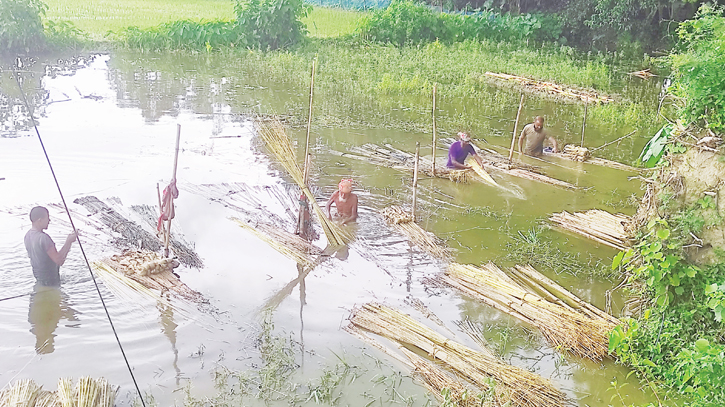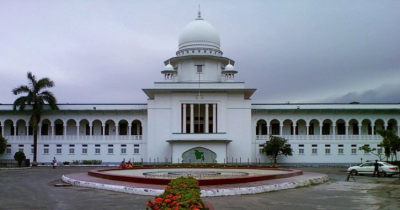
Photo: Messenger
Tangail has experienced a significant surge in jute production this year, thanks to favorable weather conditions and timely rainfall that supported the growth of the crop. Despite initial concerns over insufficient rainfall, the jute sowing season was salvaged by later showers, leading to a bumper harvest. The Agricultural Extension Department in Tangail reported that the district produced 2,052,558 bales of jute in the fiscal year 2023-24, with projections indicating an increase to 2,306,690 bales for the upcoming fiscal year 2024-25.
The timely intervention and advice from agricultural offices helped prevent major disease outbreaks, contributing to the successful cultivation of jute. The good market prices for jute have brought a sense of relief and joy to the farmers, who are now calling for sustained efforts to maintain these prices both locally and internationally.
The district has seen a rise in the cultivation of golden fiber, a variety of jute, due to its good market prices. This year, 6,200 farmers in Tangail received free jute seeds, and the crop has been cultivated across all 12 upazilas of the district. Farmers are busy with the harvest, with most fields already reaped and some still awaiting harvest. The market price for jute fibers is favorable, selling at 3,000 to 4,000 takas per maund. These fibers are used for making ropes and constructing house walls, highlighting the crop's versatility.
The target for jute cultivation in the current year was initially set at 19,600 hectares, but cultivation has exceeded this by 50 hectares. This year, 6,200 farmers in the district received jute seeds free of cost per kilogram.
Farmers have noted that indigenous varieties such as Tossa, Kenaf, Rabi-1, and Indian Bangbir yield higher than others. However, there have been issues with the timely distribution of free seeds and fertilizers, which has delayed cultivation. Despite this, farmers like Shahadat Hossain from Deuli Union in Delduar Upazila have managed to irrigate their crops during dry spells and have been pleased with the prices and yields.
Anwar Hossain, another farmer from the same village, reported a profit of 55,000 takas from selling jute harvested from 4 bighas of land. Sahanwar Hossain, who cultivated jute on 10 percent of his land, also expressed satisfaction with the profits from his jute sales.
Munirul Islam, a jute buyer at Delduar Upazila Chilmipur Hat, mentioned that he purchases jute from local farmers and sells it to various mill parties in Bangladesh. He has been buying jute at 3,500-3,800 takas per maund, indicating a healthy market demand.
Tangail's jute development officer, Waheedujjaman Khan, emphasized the importance of increasing jute cultivation and highlighted the benefits of free fertilizer distribution over the past 12 years, stating that it has helped in the growth of the jute industry in the region.
Regarding this, Dulal Uddin, the District Training Officer of the Tangail Agricultural Extension Department, said, "Good days have returned for jute farmers. Farmers have turned to jute cultivation this year with the increase in jute prices. Farmers are now making significant profits from jute farming. All kinds of support are being provided to encourage the farmers."
Messenger/Disha








